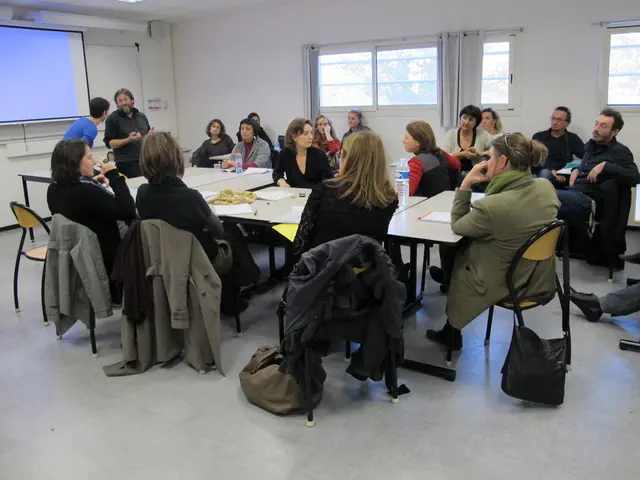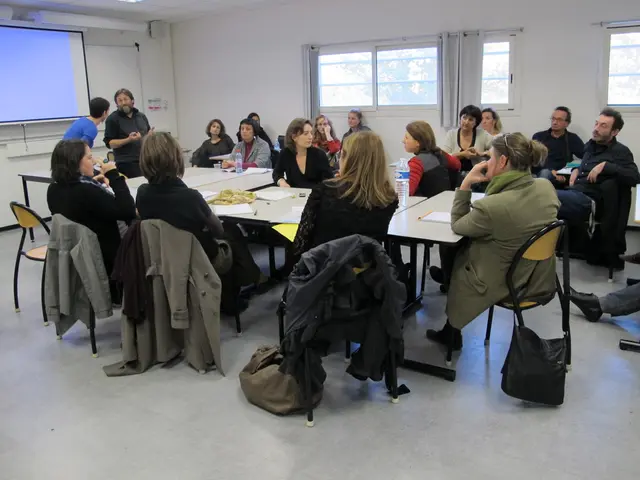Addressing the Rat Infestation in Rhineland-Palatinate: A Green Approach
Rhineland-Palatinate Rat Problem: Truth or Fiction? - Rhine-Palatinate facing rodent infestation rumors - genuine concern or exaggerated claim?
Rats are an unwanted presence in any city, leaving behind a trail of damage and potential health risks. Driven by food and shelter, they scurry through our buildings, creating havoc and spreading disease. The question remains: what can be done to tackle the rat infestation in Rhineland-Palatinate?
In cities across Rhineland-Palatinate, rats have found their niche amidst unsecured waste containers and food scraps in public spaces. This trend, according to Lisa Diener, the managing director of the Rhineland-Palatinate Association of Towns and Municipalities, leads to various forms of damage. Unfortunately, there's no comprehensive, nationwide overview of the distribution of rats in the state. However, some cities have reported an increase in infestations, particularly in connection with illegal dumping or improper waste disposal, Diener notes.
Cities in practice rely heavily on preventive measures, such as proper waste management, structural safeguards, and public awareness campaigns. These steps significantly reduce food and nesting opportunities for rats. But it's not just the cities that are gearing up. Authorities in Rhineland-Palatinate's districts are also preparing for a potential rise in rat populations. The uncontrolled spread of these animals poses significant public health, infrastructure, and agricultural risks, a spokesperson for the Association of Municipalities and Towns cautions.
Under the Infection Protection Act, rats are considered health pests. According to the Federal Environmental Agency, they can transmit over 100 diseases to humans. To control rodent-borne illnesses, there is a mandatory reporting requirement for disease-causing agents. In recent years, more than 20 district administrations in Rhineland-Palatinate have implemented measures to combat rat infestations, with Katrin Eder, the Minister of the Environment, reporting the implementation of measures to decrease the number of rats in sewers.
But what about rat poison? Concerning news from the Federal Institute for Occupational Safety and Health suggests they may not extend the approval of rat poison for private individuals. A lack of alternatives could potentially impair professional pest control. The authority responsible for this approval views rat poison critically, warning it can lead to a prolonged, painful death for animals due to internal bleeding. There are also concerns about potential risks to pets and the environment.
With the possibility of restricted rat poison usage on the horizon, it's crucial that we look toward sustainable alternatives. Goschke, from the German Environmental and Nature Conservation Association (BUND) proposes shifting focus from purely chemical control to an Integrated Pest Management (IPM) approach. Sustainable methods include eco-friendly snap traps, promoting natural rodent predators, and a strong emphasis on prevention. Prevention tactics include correct waste disposal, removing food scraps, sealing buildings to deny rodents potential hiding places, and ongoing maintenance and monitoring.
By taking a comprehensive, green approach, we can effectively control rat infestations in Rhineland-Palatinate while protecting the health and environment of our communities. This IPM approach tailored to Rhineland-Palatinate comprises six primary measures: inspection, integrated pest management, exclusion techniques, sanitation and habitat modification, education, and ongoing maintenance and monitoring. With this approach, we can enjoy our cities rat-free and with peace of mind.
References:1. Integrated Pest Management (IPM)2. Bund on Rat Control3. Rat Control in Rhineland-Palatinate4. Rat Infestation Prevention Strategies5. Rodent Management Guidelines
Community policy should include measures for managing rat infestations using an integrated pest management (IPM) approach in Rhineland-Palatinate. Science plays a crucial role in developing effective strategies for rodent control.
A green approach to rat infestations in Rhineland-Palatinate involves promoting sustainable alternatives to rat poison, such as eco-friendly snap traps, promoting natural rodent predators, and emphasizing prevention measures.
Workplace wellness can be improved by reducing potential health risks associated with rat infestations, such as the transmission of diseases. Medical conditions, including chronic diseases, respiratory conditions, and digestive health issues, may be exacerbated by exposure to rodents and their droppings.
Eye health, hearing, and skin care may also be affected by rat infestations, as rodents can carry various diseases that pose potential health risks to humans. Proper handling and disposal of rat-infected materials are essential to prevent the spread of diseases.
Fitness and exercise, mental health, and autoimmune disorders could also be impacted due to the stress and anxiety caused by living in an environment with a rat infestation. Therapies and treatments, such as counseling and stress management techniques, may be necessary to help individuals cope with the psychological impact of rat infestations.
Nutrition is an essential component of overall health and wellness, and a balanced diet can help strengthen the immune system, making individuals less susceptible to diseases transmitted by rats. Cardiovascular health is also significant, as physical activity can help boost the immune system and improve overall health.
Industry professionals can play a role in preventing rat infestations by implementing proper sanitation practices in the workplace and disposing of waste correctly. CBD products may also attract rats, so it's essential to properly store and manage these substances.
Neurological disorders, such as Alzheimer's disease and Parkinson's disease, can be severe and debilitating. Some neurological disorders are linked to environmental factors and exposure to toxins, so preventing rat infestations can help reduce the potential risks associated with these conditions.
Finance is another critical aspect of rat control. The cost of treating rat infestations, both in terms of medical expenses and property damage, can be substantial. Therefore, effective strategies for rat control can help save money in the long run.
Skin conditions, such as eczema and psoriasis, can be exacerbated by environmental factors, including exposure to rodents and their droppings. Proper hygiene practices and cleaning can help reduce the risk of developing these conditions.
Interior design plays a role in preventing rat infestations. Properly sealing buildings and preventing access points can help deny rats potential hiding places. Cooking practices, such as storing food properly and cleaning surfaces, can also help reduce the risk of attracting rats.
Wearables and smart home devices can help monitor for rat infestations and alert homeowners to potential issues. Cybersecurity is also important, as these devices can be hacked, leading to potential privacy concerns.
Lifestyle choices, such as outdoor living, fashion and beauty, food and drink, and dining, can impact the risk of rat infestations. For example, leaving food outdoors or improperly disposing of waste can attract rats.
Global cuisines and baking can be enjoyed while minimizing the risk of rat infestations by following proper sanitation practices and waste disposal procedures. Love and dating can also be affected by rat infestations, as the presence of rats can negatively impact the living environment and quality of life.
Businesses and personal finance can be impacted by rat infestations, as they can lead to lost productivity, property damage, and medical expenses. Recipes and home-and-garden projects, such as home improvement and gardening, can also help reduce the risk of rat infestations by following sustainable living practices.
Banks and insurance companies may offer coverage for rat-related damages and expenses. Gadgets, smartphones, and data and cloud computing can help monitor for rat infestations and implement IPM strategies.
Home and garden projects, such as sustainable living and technology integration, can help reduce the risk of rat infestations by following IPM guidelines. Artificial intelligence and healthy cooking can also help develop more effective strategies for rat control.
Relationships can be impacted by the stress and anxiety caused by living with a rat infestation. Effective communication and cooperation between community members, businesses, and authorities can help address the issue and reduce its impact on relationships.
Addressing the rat infestation in Rhineland-Palatinate requires a comprehensive, integrated approach that takes into account various aspects of community policy, environmental health, workplace wellness, lifestyle, and personal finance. By working together and implementing IPM strategies, we can ensure a rat-free and healthy environment for all.








